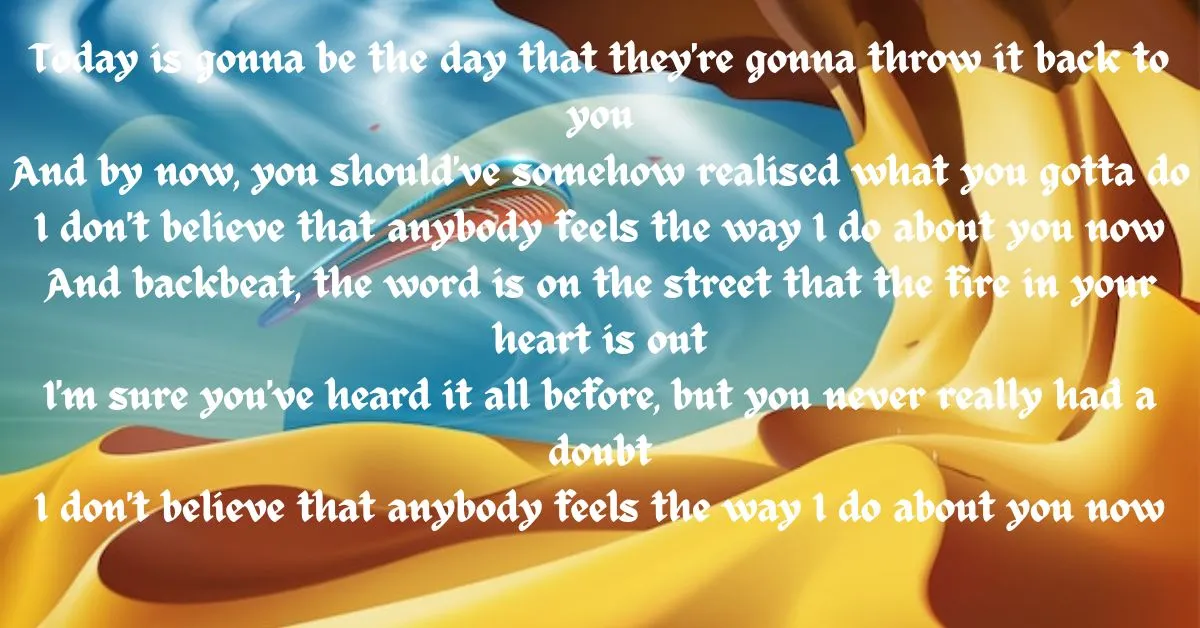Entertainment
“Wonderwall Lyrics”: Exploring the Enduring Legacy of Oasis’s

Wonderwall Lyrics, some songs stand out in the annals of rock history not just for their outstanding musical quality but also for the cultural influence they have. The English rock group Oasis’s “Wonderwall” is one example of a timeless hit. Composed by Noel Gallagher, the main guitarist and principal composer of the band, “Wonderwall” became a seminal hit off their legendary 1995 album, (What’s the Story) Morning Glory? This piece explores the intriguing history of the composition, development, and ongoing influence of this well-known song.
Origins and Inspiration
“Wonderwall” was conceived amidst the creative whirlwind of Oasis’s rise to prominence in the mid-1990s. Noel Gallagher, known for his prolific songwriting prowess, crafted the Wonderwall Lyrics that would come to define the essence of the song. The inspiration behind “Wonderwall” is deeply personal, with Gallagher drawing from his own experiences and relationships.
Originally titled “Wishing Stone,” the song underwent a transformation before finding its place as “Wonderwall.” It is intriguing to note that Gallagher initially wrote the song for Meg Mathews, his then-girlfriend and eventual wife. This intimate connection adds layers of emotional depth to the lyrics, as they reflect themes of longing, companionship, and salvation.
Musical Composition and Production
Musically, “Wonderwall Lyrics” is characterized by its distinctive acoustic guitar riff, which instantly captivates listeners with its simplicity yet infectious melody. Produced by Noel Gallagher himself alongside Owen Morris, the song epitomizes the signature sound of Oasis during their heyday. The seamless blend of acoustic and electric elements, coupled with Liam Gallagher’s distinctive vocals, creates a sonic landscape that resonates with audiences across generations.
Recorded at Rockfield Studios in Wales, “Wonderwall” benefited from the band’s meticulous attention to detail and their relentless pursuit of sonic perfection. The recording process was reportedly intense yet fruitful, resulting in a track that seamlessly captured the essence of Oasis’s musical vision.
Commercial Success and Critical Acclaim
Upon its release as the fourth single from (What’s the Story) Morning Glory?, “Wonderwall” swiftly ascended the charts, catapulting Oasis to even greater heights of fame and acclaim. The song’s universal appeal struck a chord with audiences worldwide, earning critical praise for its melodic brilliance and lyrical depth.
The commercial success of “Wonderwall” is reflected in its certifications by esteemed industry bodies such as the British Phonographic Industry and the Australian Recording Industry Association. With septuple platinum certification in the UK and 11-times platinum certification in Australia, the song solidified its status as a timeless classic that continues to resonate with listeners decades after its release.
Themes and Interpretations
At its core, “Wonderwall” is a song that explores themes of companionship, longing, and the search for salvation. The imagery of an imaginary friend who serves as a beacon of hope in times of darkness resonates with listeners on a deeply emotional level. Whether interpreted as a romantic ode or a broader metaphor for personal redemption, the lyrics of “Wonderwall” invite multiple interpretations, each imbued with its own sense of poignancy and resonance.
Live Performances and Legacy
Beyond its studio recording, “Wonderwall” has enjoyed a vibrant life of its own through live performances by Oasis and its individual members in their solo endeavors. The song has been a staple of Oasis’s concert repertoire, featuring prominently on various tours, including the (What’s the Story) Morning Glory? Tour, Be Here Now Tour, and Standing on the Shoulder of Giants Tour.
Even after the dissolution of Oasis, both Noel and Liam Gallagher have continued to embrace “Wonderwall” as a cornerstone of their solo careers. Its enduring popularity speaks to the song’s timeless appeal and its ability to transcend generational boundaries, uniting audiences in a shared love for its melodic beauty and emotional resonance.
Conclusion
“Wonderwall” stands as a testament to the enduring legacy of Oasis and their impact on the landscape of modern rock music. From its humble origins as a heartfelt tribute to a loved one to its status as a global anthem of hope and companionship, the song continues to captivate audiences with its timeless charm and universal themes. As we reflect on the journey of “Wonderwall,” we are reminded of the transformative power of music to touch hearts, inspire minds, and forge connections that transcend the passage of time.
Entertainment
StreamEast Live: Your Ultimate Guide to Sports Streaming

So, what’s the deal with StreamEast Live? If you’re on the hunt for a streaming platform that lets you catch your favorite sports events without a hitch, you’ve probably stumbled upon StreamEast Live. This platform is gaining traction among sports enthusiasts for its user-friendly interface and broad range of content. Let’s dive in and see what makes StreamEast Live a standout choice for streaming sports.
Features of StreamEast Live
User Interface
First things first, StreamEast Live sports a sleek and intuitive user interface. It’s designed to be easy on the eyes and simple to navigate. You won’t find yourself lost in a maze of options; instead, everything is laid out clearly, making it a breeze to find what you’re looking for.
Streaming Quality
Quality matters, right? StreamEast Live offers high-definition streaming, ensuring you don’t miss any detail of the action. Whether you’re watching a nail-biting soccer match or a high-speed Formula 1 race, the clarity and smoothness of the stream will keep you glued to your screen.
Content Availability
One of the biggest draws of StreamEast Live is its extensive content library. From mainstream sports like football and basketball to niche ones like cricket and MMA, there’s something for every sports fan. The platform also provides both live streams and replays, so you can catch up on games you missed.
How to Access StreamEast Live
Device Compatibility
Worried about whether your device can handle it? StreamEast Live is compatible with a variety of devices. Whether you prefer watching on your smartphone, tablet, laptop, or smart TV, you’re covered. The platform ensures that you get a seamless experience regardless of your device.
Sign-Up Process
Getting started is as easy as pie. Head over to the StreamEast Live website, sign up with your email, and boom—you’re in! The sign-up process is straightforward and won’t have you jumping through hoops.
Navigating StreamEast Live
Homepage Layout
The homepage is your gateway to all things sports. It’s laid out in a way that highlights current live events, upcoming matches, and recommended replays. The layout is clean, with everything organized into neat categories.
Search and Discover
Looking for something specific? The search function is robust and quick. Whether you’re searching by sport, team, or event, you’ll find it in no time. Plus, the discover feature helps you stumble upon new and exciting content that you might not have considered before.
Personalization Options
Who doesn’t like a personal touch? StreamEast Live offers personalization options, allowing you to set your favorite sports, teams, and leagues. This customization means you get tailored recommendations and notifications about what matters most to you.
Streaming Sports on StreamEast Live
Popular Sports Available
From the Premier League to the NBA, StreamEast Live covers a wide array of popular sports. You can enjoy live streams of football, basketball, baseball, hockey, and even less mainstream sports like tennis and rugby.
Live Streaming vs. Replays
Can’t catch the game live? No worries. StreamEast Live offers replays, so you can watch the full event at your convenience. This flexibility ensures you never miss a moment, even if you can’t watch it live.
Benefits of Using StreamEast Live
Cost-Effectiveness
Why break the bank? StreamEast Live offers a range of subscription plans that are easy on the wallet. Compared to traditional cable subscriptions, it’s a cost-effective way to get your sports fix.
Convenience and Accessibility
StreamEast Live is all about convenience. With the ability to watch on multiple devices and the option to switch between live streams and replays, it fits perfectly into your busy lifestyle. No more missing out because you’re stuck in traffic or tied up with work.
StreamEast Live vs. Competitors
Comparison with Other Streaming Services
How does StreamEast Live stack up against the competition? It holds its own quite well. Compared to other sports streaming services, StreamEast Live offers comparable or better streaming quality and a wider range of sports.
Unique Selling Points
What sets StreamEast Live apart are its user-friendly interface, extensive content library, and affordability. These factors make it a compelling choice for sports fans looking for a reliable streaming service.
Technical Requirements
Internet Speed Recommendations
To ensure a smooth streaming experience, it’s recommended to have a stable internet connection with at least 5 Mbps for standard definition and 25 Mbps for high definition. This ensures you get the best quality without annoying buffering.
Supported Devices
StreamEast Live supports a variety of devices including iOS and Android smartphones, tablets, laptops, and smart TVs. This flexibility means you can enjoy your favorite sports on the go or from the comfort of your home.
User Experience and Reviews
Customer Testimonials
Users rave about the seamless streaming experience and the wide range of sports available. Many appreciate the high-quality streams and the ease of use the platform offers.
Common Complaints and Resolutions
While most feedback is positive, some users have reported occasional buffering issues. However, these are often resolved with a quick check of internet speeds or switching to a lower resolution stream.
Subscription Plans and Pricing
Free vs. Paid Plans
StreamEast Live offers both free and paid subscription plans. The free plan provides access to a limited range of content, while the paid plans offer a comprehensive sports package with additional features like ad-free viewing.
Value for Money
Considering the range of content and the quality of service, StreamEast Live offers great value for money. The subscription plans are competitively priced, making it a budget-friendly option for sports enthusiasts.
Legal and Safety Considerations
Legitimacy of the Service
StreamEast Live operates legally, providing legitimate streams of sports events. It’s important to use authorized services to avoid potential legal issues and to support the creators and broadcasters.
Security Features
StreamEast Live takes user security seriously. The platform uses encryption and secure payment methods to protect your personal information and ensure a safe streaming experience.
Tips for Maximizing Your Experience
Optimizing Streaming Quality
To get the best streaming quality, ensure you have a stable internet connection and close any unnecessary applications that might be using bandwidth. Adjusting the video quality settings can also help if you experience buffering.
Best Practices for Usage
Make the most of your subscription by exploring the personalization options. Set up notifications for your favorite sports and events so you never miss out. Additionally, use the replay feature to catch up on games you couldn’t watch live.
Conclusion
StreamEast Live is a fantastic option for sports enthusiasts looking for a reliable and affordable streaming service. With its user-friendly interface, high-quality streams, and extensive content library, it stands out as a top choice in the streaming landscape. Whether you’re catching live games or watching replays, StreamEast Live ensures you never miss a moment of the action.
Frequently Asked Questions
- Is StreamEast Live free?
- StreamEast Live offers both free and paid plans. The free plan provides access to a limited selection of content, while the paid plans offer a broader range of sports and features.
- What sports can I watch on StreamEast Live?
- StreamEast Live covers a wide variety of sports including football, basketball, baseball, hockey, tennis, and more. There’s something for every sports fan.
- Can I watch replays on StreamEast Live?
- Yes, StreamEast Live offers replays of sports events. This feature allows you to watch games you missed at your convenience.
- What devices are compatible with StreamEast Live?
- StreamEast Live is compatible with iOS and Android smartphones, tablets, laptops, and smart TVs. This ensures you can enjoy streaming on multiple devices.
- How do I sign up for StreamEast Live?
- Signing up is easy. Visit the StreamEast Live website, enter your email, and follow the instructions to create an account. You’ll be streaming in no time!
Entertainment
YouTube TV: The Ultimate Guide

What is YouTube TV? In a nutshell, YouTube TV is a streaming service that allows you to watch live TV from major broadcast and popular cable networks. Launched by Google in 2017, it’s a modern twist on traditional cable TV, offering a more flexible and affordable way to enjoy your favorite shows, sports, and movies.
Features of YouTube TV
Channel Lineup
YouTube TV boasts an impressive lineup of over 85 channels, including ABC, CBS, NBC, Fox, ESPN, and many more. Whether you’re into news, sports, entertainment, or kids’ programming, there’s something for everyone.
Cloud DVR
One of the standout features of YouTube TV is its cloud DVR with unlimited storage. You can record as many shows as you want and keep them for up to nine months. No more worrying about missing your favorite episodes!
User Interface
The user interface is sleek, intuitive, and easy to navigate. You can effortlessly browse through channels, search for specific shows, and discover new content based on your preferences.
Subscription Plans and Pricing
Monthly Subscription Cost
YouTube TV’s base plan costs around $72.99 per month, giving you access to all the standard channels. While it’s not the cheapest option on the market, the value you get is substantial.
Add-ons and Premium Channels
For those looking to enhance their viewing experience, YouTube TV offers various add-ons and premium channels like HBO Max, Showtime, and Starz, for an additional monthly fee.
Comparing YouTube TV with Traditional Cable
Cost Comparison
Compared to traditional cable, YouTube TV can be more cost-effective. With cable, you often have to pay for equipment rentals, hidden fees, and long-term contracts. YouTube TV eliminates these extra costs.
Channel Availability
While cable might offer more channels, YouTube TV covers most of the popular ones. Unless you’re looking for niche channels, you’ll likely find everything you need.
Flexibility and Contract Terms
One of the biggest perks of YouTube TV is the flexibility. There are no contracts, so you can cancel anytime without penalties. Plus, you can watch on multiple devices, whether at home or on the go.
Device Compatibility
Supported Devices
YouTube TV is compatible with a wide range of devices, including smartphones, tablets, smart TVs, gaming consoles, and streaming devices like Roku, Amazon Fire TV, and Chromecast.
Multi-Device Streaming
You can stream YouTube TV on up to three devices simultaneously, making it perfect for families or households with multiple viewers.
User Experience
Interface Design
The interface is clean and user-friendly. It’s easy to switch between live TV, recorded shows, and on-demand content. Plus, the search function is powerful, helping you find what you’re looking for quickly.
Ease of Use
Setting up and using YouTube TV is a breeze. The app guides you through the setup process, and within minutes, you’re ready to start watching.
Customer Reviews
Most users praise YouTube TV for its ease of use, channel selection, and reliable streaming quality. However, some have noted occasional buffering issues and the high monthly cost.
Pros and Cons of YouTube TV
Advantages
- Extensive channel lineup
- Unlimited cloud DVR storage
- No contracts
- Multi-device streaming
Disadvantages
- Higher monthly cost compared to some competitors
- Occasional streaming issues
- Limited availability of niche channels
How to Get Started with YouTube TV
Signing Up
To get started, visit the YouTube TV website or download the app. Sign in with your Google account, choose your subscription plan, and enter your payment information.
Setting Up the App
Once you’re signed up, download the YouTube TV app on your preferred devices. Follow the on-screen instructions to set up your account, and you’re ready to start streaming!
Customization and Personalization
User Profiles
YouTube TV allows you to create up to six user profiles per account. Each profile gets its own personalized recommendations, DVR, and viewing history.
Personalized Recommendations
Based on your viewing habits, YouTube TV suggests shows and movies you might like. The more you watch, the better the recommendations get.
Parental Controls
Setting Up Parental Controls
To ensure your kids only watch age-appropriate content, you can set up parental controls. Go to the settings menu and create a PIN to restrict access to certain shows and channels.
Managing Content for Kids
YouTube TV offers a range of kids’ programming, including popular channels like Nickelodeon and Cartoon Network. You can easily manage and monitor what your kids are watching.
YouTube TV and Live Sports
Sports Channels Available
Sports fans will love YouTube TV’s selection of channels, including ESPN, Fox Sports, NBC Sports, and regional sports networks. You can catch all the big games live.
Watching Live Sports
The streaming quality for live sports is excellent, with minimal lag and high-definition broadcasts. Plus, the cloud DVR lets you record games to watch later.
On-Demand Content
Movies and TV Shows on Demand
In addition to live TV, YouTube TV offers a vast library of on-demand content. You can watch recent episodes of popular shows, blockbuster movies, and more.
Original Content
While not as extensive as some other services, YouTube TV does offer original content, including YouTube Originals, which are exclusive to the platform.
Technical Support and Customer Service
Getting Help and Support
If you encounter any issues, YouTube TV provides a robust help center with articles, tutorials, and troubleshooting guides. You can also contact customer support via chat or email.
Common Issues and Solutions
Common issues include buffering, login problems, and billing questions. Most of these can be resolved by restarting the app, checking your internet connection, or updating your payment information.
Comparing YouTube TV with Other Streaming Services
YouTube TV vs. Hulu Live
Hulu Live offers a similar channel lineup and price point but includes access to Hulu’s extensive on-demand library. If you’re a fan of Hulu originals, this might be the better choice.
YouTube TV vs. Sling TV
Sling TV is cheaper but offers fewer channels and no unlimited DVR. However, it’s a good option if you’re looking to save money and don’t need a wide range of channels.
YouTube TV vs. FuboTV
FuboTV is ideal for sports enthusiasts, with a broader selection of sports channels. However, it’s pricier and might not offer as many general entertainment channels.
Future of YouTube TV
Upcoming Features and Updates
YouTube TV is continually evolving, with new features and channels being added regularly. Upcoming updates may include enhanced DVR functionality, more customization options, and improved streaming quality.
Market Trends and Predictions
As more consumers cut the cord, streaming services like YouTube TV are expected to grow in popularity. The trend towards personalized, on-demand content will likely continue, shaping the future of TV viewing.
Conclusion
YouTube TV is a solid choice for anyone looking to replace traditional cable with a more flexible, affordable option. With its extensive channel lineup, unlimited cloud DVR, and user-friendly interface, it offers a compelling package. Whether you’re a sports fan, a movie buff, or just looking for a better way to watch TV, YouTube TV has something for everyone.
FAQs
What is YouTube TV?
YouTube TV is a live TV streaming service that offers a variety of channels, including major broadcast networks, popular cable channels, and sports networks. It provides an alternative to traditional cable TV with more flexibility and no contracts.
How much does YouTube TV cost?
The base subscription for YouTube TV costs around $72.99 per month. Additional costs may apply for premium channels and add-ons.
Can I record shows on YouTube TV?
Yes, YouTube TV offers unlimited cloud DVR storage, allowing you to record as many shows and movies as you want and keep them for up to nine months.
Is YouTube TV better than cable?
YouTube TV can be a better option than cable for many people due to its lower cost, flexibility, and lack of contracts. However, it depends on your specific needs and preferences.
What devices are compatible with YouTube TV?
YouTube TV is compatible with a wide range of devices, including smartphones, tablets, smart TVs, gaming consoles, and streaming devices like Roku, Amazon Fire TV, and Chromecast.
Entertainment
Disney Plus: Your Ultimate Guide to Streaming Magic

Imagine a world where all your favorite Disney movies and shows are just a click away. That’s exactly what Disney Plus offers. In a sea of streaming services, Disney Plus stands out, bringing the magic of Disney into your living room. But what makes it so special? Let’s dive into the enchanting world of Disney Plus and see why it has become a must-have for entertainment lovers.
History of Disney Plus
Disney Plus made its grand debut in November 2019, aiming to compete with giants like Netflix and Amazon Prime. Its launch was a significant moment, marking Disney’s entry into the direct-to-consumer streaming market. Over the years, Disney Plus has expanded its reach, becoming available in numerous countries and amassing millions of subscribers. It’s safe to say that Disney Plus has cemented its place in the streaming landscape.
Subscription Plans
Disney Plus offers a variety of subscription plans to cater to different needs. The basic plan provides access to the entire library, perfect for those who just want to enjoy Disney content. The premium plan includes added benefits like higher streaming quality and additional features. There are also bundles that include other services like Hulu and ESPN+, offering more bang for your buck.
Device Compatibility
Worried about whether Disney Plus will work on your device? Fret not! Disney Plus is compatible with a wide range of devices including smartphones, tablets, smart TVs, gaming consoles, and more. Whether you’re using an Apple TV, Roku, or an Android device, Disney Plus has got you covered. Plus, with support for 4K streaming and Dolby Atmos, the viewing experience is top-notch.
Content Library
The crown jewel of Disney Plus is undoubtedly its vast content library. You can dive into Disney classics like “The Lion King” and “Beauty and the Beast,” relive the magic of Pixar movies like “Toy Story” and “Finding Nemo,” or embark on epic adventures with the Marvel Cinematic Universe and the Star Wars saga. For those who love nature and science, National Geographic documentaries are also available, providing educational and breathtaking content.
Original Content
Disney Plus isn’t just about nostalgic favorites; it’s also a hub for original content. Hits like “The Mandalorian” have taken the world by storm, and there’s no shortage of new and exciting series and movies being added regularly. From “WandaVision” to “Loki,” Disney Plus originals are a testament to the platform’s commitment to delivering fresh and engaging content.
User Experience
Navigating Disney Plus is a breeze, thanks to its intuitive interface and easy-to-use features. You can set up parental controls to ensure a safe viewing experience for kids and utilize accessibility features like subtitles and audio descriptions. The user-friendly design makes it simple to find and enjoy your favorite shows and movies.
Popular Shows and Movies
What’s hot on Disney Plus right now? From classic animated films to the latest Marvel blockbusters, there’s always something trending. Popular shows like “The Simpsons” and “Star Wars: The Clone Wars” keep audiences hooked, while audience favorites like “Frozen” and “The Avengers” continue to attract viewers of all ages.
How to Get the Most Out of Disney Plus
Want to make the most of your Disney Plus subscription? Here are some tips and tricks. Customize your watchlist to keep track of shows and movies you plan to watch. Utilize the group watch feature to enjoy content with friends and family, no matter where they are. These little hacks can enhance your Disney Plus experience and make it even more enjoyable.
Disney Plus vs. Competitors
How does Disney Plus stack up against other streaming services? Let’s compare. Unlike Netflix, which offers a wide variety of content, Disney Plus focuses on family-friendly and franchise-specific content. Compared to Amazon Prime Video, Disney Plus may have a smaller library, but its exclusive Disney, Marvel, and Star Wars content give it a unique edge. And while HBO Max offers a range of Warner Bros. titles, Disney Plus’ extensive collection of beloved classics and new originals sets it apart.
Disney Plus in Different Regions
Disney Plus is truly a global service, available in many countries around the world. However, there are some regional content differences. For example, some shows and movies may be available in one country but not in another due to licensing agreements. Despite these variations, Disney Plus strives to offer a rich and diverse content library to its global audience.
Future of Disney Plus
What’s next for Disney Plus? The future looks bright with upcoming features like expanded content libraries and enhanced user interfaces. Disney has big plans for its streaming service, including expansion into new markets and continued investment in original programming. The goal is to keep subscribers engaged and excited about what’s to come.
Common Issues and Solutions
Like any streaming service, Disney Plus can sometimes encounter technical issues. Common problems include buffering, login issues, and playback errors. Fortunately, most of these issues can be resolved with simple troubleshooting steps like checking your internet connection, restarting your device, or updating the app. If all else fails, customer support is available to help you out.
Benefits of Disney Plus
So, why choose Disney Plus? The family-friendly content makes it a great option for households with kids. The exclusive releases of Disney, Marvel, and Star Wars content ensure you’re always in for a treat. And with its affordable pricing, Disney Plus offers excellent value for money.
Conclusion
Disney Plus is a treasure trove of entertainment, offering something for everyone. From timeless Disney classics to exciting new originals, it’s a platform that continues to evolve and grow. Whether you’re a die-hard Disney fan or just looking for a quality streaming service, Disney Plus is a fantastic choice.
FAQs
- How much does Disney Plus cost?
Disney Plus offers several subscription plans, with prices varying by region. Typically, the basic plan costs around $7.99 per month, while bundles with other services may cost more. - Can I download content to watch offline?
Yes, Disney Plus allows you to download content for offline viewing, making it easy to enjoy your favorite shows and movies on the go. - Is there a free trial for Disney Plus?
Disney Plus occasionally offers free trials for new subscribers. Check the official website for any current promotions. - How many devices can stream Disney Plus simultaneously?
Disney Plus allows up to four simultaneous streams per account, so multiple users can watch different content at the same time. - Does Disney Plus have ads?
Disney Plus is an ad-free service, ensuring an uninterrupted viewing experience.
-

 Technology8 months ago
Technology8 months ago社工库: Navigating the Depths of Social Engineering Databases
-

 News6 months ago
News6 months agoFinding the Truth Behind a Trails Carolina Death
-

 Education7 months ago
Education7 months agoFortiOS 7.2 – NSE4_FGT-7.2 Free Exam Questions [2023]
-

 Technology3 months ago
Technology3 months agoAmazon’s GPT-55X: A Revolutionary Leap in AI Technology
-

 History & Tradition9 months ago
History & Tradition9 months agoλιβαισ: Unraveling Its Mystique
-

 Education8 months ago
Education8 months agoExploring the Significance of 92career
-

 News8 months ago
News8 months agoClaudia Goldin: A Trailblazer in Understanding Gender Pay Gap
-

 Entertainment7 months ago
Entertainment7 months agoFree Tube Spot: Your Gateway to Endless Entertainment












